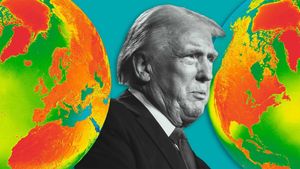The situation in northern Gaza has escalated dramatically, with Israel's military operations raising serious concerns about humanitarian crises and allegations of ethnic cleansing. After several weeks of intense bombardment, reports indicate thousands of civilians trapped face not just the direct risks from military actions but also severe shortages of food, water, and medical services. Observers, human rights organizations, and Palestinian officials have voiced fears of systematic ethnic cleansing as Israel's military advances seemingly targeted the civilian population.
Since early October, the humanitarian situation has deteriorated significantly. According to Anas al-Sharif, reporting from northern Gaza, the population is being “annihilated right before the world's eyes.” The Israeli military initially claimed its operations were focused on eradicatiing Hamas forces, yet news reports and on-the-ground observations tell another story. Palestinian communities still unable to evacuate reported being subject to airstrikes, leaving many residents without the basic necessities needed for survival.
Remarkably, the UN Relief and Works Agency (UNRWA) has stated, "Israeli authorities are preventing Palestinians from accessing the essentials for survival, including water," emphasizing the blockade's impact on humanitarian operations. This reinforces fears of potential famine and outbreak of diseases. The agency noted, “No aid has been allowed since the campaign began,” which has only exacerbated the plight of civilians stuck amid the conflict.
Despite Israeli statements claiming otherwise, aid agencies have described the conditions for those residing within northern Gaza as "beyond appalling," with medical facilities struggling to function. The last remaining hospital capable of providing services, Kamal Adwan Hospital, has been struck repeatedly, disrupting the little medical care available. Louise Wateridge, UNRWA’s senior emergency officer, described the scene vividly: "Across northern Gaza, there is no way of telling where the destruction starts or ends." Many homes and significant infrastructure, including hospitals, schools, and places of worship, have been reduced to rubble.
The attempts of Israel to communicate evacuation options have relied heavily on warnings disseminated via drones and leaflets, directing civilians southward. Yet many families remain skeptical about moving south, seeing little respite considering the dire conditions persist throughout Gaza. "What is there [in the south]?" Wateridge questioned, referring to the scarcity of food and the overcrowded nature of makeshift shelters.
This complex and dire situation tends to evoke various reactions not just locally, but globally, as countries take sides, often reflective of longstanding geopolitical tensions. Pakistan, for example, welcomed the UN Special Rapporteur’s report highlighting what it referred to as Israel's genocide against Palestinians. The spokesperson of Pakistan’s Foreign Office called for international action to halt Israeli violations and deliver humanitarian aid without restrictions. “We support her call on the international community to act decisively,” Mumtaz Zahra Baloch emphasized.
The broader international community is indecisive as internal pressures mount within Israeli politics, particularly as Donald Trump’s recent election introduces uncertainty. Analysts point out Israel may be waiting for Trump to take office to adjust its strategic approach, possibly emboldened by American support. Netanyahu's administration has already signaled decreased willingness to negotiate or comply with Biden’s administration demands during this transitional period.
Secretary of State Antony Blinken has remained vocal about the U.S. commitment to ensuring aid gets through and reducing hostilities. Still, with the shift toward Trump’s presidency, many speculate this pressure and influence will wane. Facing the prospect of a less engaged American strategy, regional actors like Hamas and Hezbollah have adjusted their expectations and actions, anticipating increased support from Trump compared to the Biden administration.
The devastating ripple effects on Palestinians are palpable. Reports from Gaza indicate those who remained are caught not just between military operations but facing potential famine as food resources dwindled. Rights groups are clamoring for urgent international intervention, claiming many civilians will perish either from direct military assaults or the consequences of starvation and disease. The international community's response remains to be seen, with pressure from various nations to halt the conflict and provide humanitarian solutions looming large.
Heba Morayet, Amnesty's Director for the Middle East and North Africa, encapsulated the growing despair from rights organizations, urging immediate action to address human rights violations occurring daily. "The world must stop standing by as siege starvation and atrocity crimes displace and destroy civilians and civilian life," she stated starkly, reinforcing calls for tangible action from global leaders.
These alarming developments point toward grave uncertainties not just for those currently residing within Gaza but also for the broader geopolitical climate as nations grapple with responses amid rising tensions. Trump’s potential foreign policy orientations may spark new conflicts, with observers warning the consequences could lead to escalated violence throughout the region, drawing more countries and communities directly contemplating direct repercussions from Israel's military strategies.
Calls for action come as the humanitarian needs intensify by the day amid blockades and military operations, with the risk of long-term ramifications for the millions still living under siege. The complexity of this situation hinges on various elements: from regional politics to international interventions and local dynamics, which continue to play out with devastating effects on vulnerable populations caught at the center of conflict.



